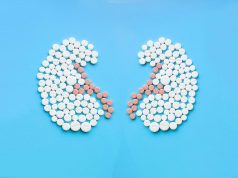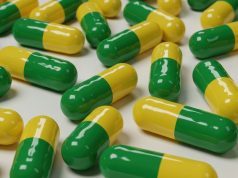Randomized, open-label, phase 3 trials conducted in patients with chronic kidney disease undergoing, not undergoing dialysis
FRIDAY, Nov. 12, 2021 (HealthDay News) — For patients with chronic kidney disease (CKD) who are and are not undergoing hemodialysis, the oral hypoxia-inducible factor prolyl hydroxylase inhibitor daprodustat is noninferior to injectable erythropoiesis-stimulating agent (ESA) for the treatment of anemia, according to two studies published online Nov. 5 in the New England Journal of Medicine. The research was published to coincide with Kidney Week, the annual meeting of the American Society of Nephrology, held virtually from Nov. 4 to 7.
Ajay K. Singh, M.B., B.S., from Brigham and Women’s Hospital in Boston, and colleagues conducted a phase 3 trial in which 2,964 patients with CKD who were undergoing dialysis and had a hemoglobin level of 8.0 to 11.5 g/dL were randomly assigned to receive either daprodustat or ESA. The researchers found that from baseline to weeks 28 through 52, the mean change in the hemoglobin level was 0.28 ± 0.02 g/dL and 0.10 ± 0.02 g/dL in the daprodustat and ESA groups, respectively (difference, 0.18 g/dL), which met the prespecified noninferiority margin. A major adverse cardiovascular event occurred in 25.2 and 26.7 percent of patients in the daprodustat and ESA groups, respectively, during a median follow-up of 2.5 years (hazard ratio, 0.93; 95 percent confidence interval, 0.81 to 1.07), which met the prespecified noninferiority margin.
In a second study, Singh and colleagues compared daprodustat with darbepoetin alfa for treatment of anemia in 3,872 patients with CKD who were not undergoing dialysis. The researchers found that from baseline to weeks 28 through 52, the mean change in the hemoglobin level was 0.74 ± 0.02 and 0.66 ± 0.02 g/dL in the daprodustat and darbepoetin alfa groups, respectively (difference, 0.08 g/dL), which met the prespecified noninferiority margin.
“We found that oral delivery of daprodustat worked just as well as conventional therapy — increasing and maintaining hemoglobin levels among nondialysis patients and maintaining levels among patients on dialysis — and was just as safe,” Singh said in a statement.
Several authors from both studies disclosed financial ties to biopharmaceutical companies, including GlaxoSmithKline, which manufactures daprodustat and funded both studies.
Abstract/Full Text 1 (subscription or payment may be required)
Abstract/Full Text 2 (subscription or payment may be required)
Editorial (subscription or payment may be required)
Copyright © 2021 HealthDay. All rights reserved.








